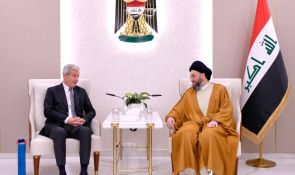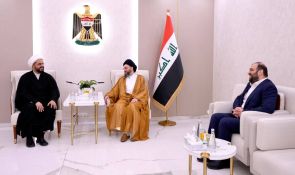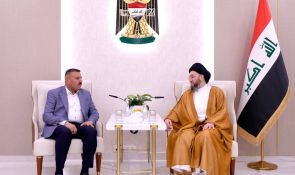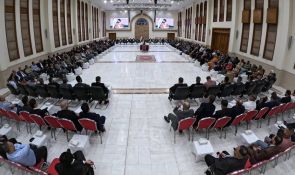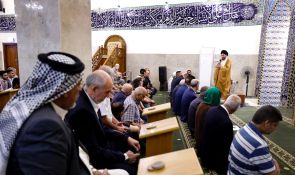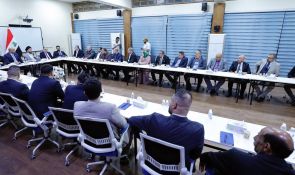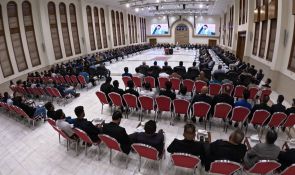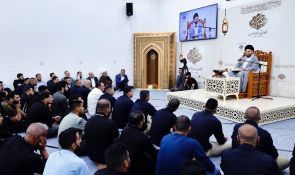SAYYID AMMAR AL-HAKIM: “Solving the political crisis lies in commitment to the constitution, the agreements that are in harmony with it, and the blocs making concessions to each other.”
We nowadays are going through tough political conditions, and we do not think that there are those who agree with or feel comfortable about the political situation and the successive crises which we live. The matters have reached a degree which we did not hope they would, but we believe that the solution is possible and available if we want to resolve these crises and deal with them. It lies in putting together a program to manage this crisis because the absence of the management element in the crisis will put us in a status of stumbling and passivity, and it does not achieve the anticipated results. We need to manage this crisis and others whenever they take place. We must not let them interact as they do without restrictions, or that we move without limits for our movement. There are red lines. Even crises must submit to these red lines. Let us differ with each other, but within limits. Let some problems happen, and it may be quite natural, but with restrictions. If crises take place, we must frame them, limit them with borders and straiten them then go to treat them. But if these barriers are broken and these red lines, we will go to a no-return path, the path of the unknown which we do not wish the homeland will be dragged to it any day at all.
Necessity of mutual concessions among the blocs to achieve the Iraqi national interest
We are certain that this crisis can be treated the same way previous crises in our homeland were treated. The basis in solving this crisis and all crises is the realistic outlook for this crisis, and we have to be realistic in evaluating the crises and in looking for solutions and treatments. If we want to cast a look realistically, we will find Iraq going within two paths: commitment to the constitution and adherence to the consensuses that do not collide with the constitution. We used to find both of these paths in every crisis, sector and station of building Iraq. But we nowadays need to add a third path due to the complexity of this crisis and its turning from a crisis into a complex. This path is represented in mutual concessions in order to achieve the Iraqi national interest. If there is collaboration between the path of commitment to the constitution and that of consensuses that do not violate the constitution, with the mutual concessions which are in harmony with the national interest…, we will then have put a road map for a clear solution for the current crisis. The constitutional problems must be referred to the constitution and be treated according to whatever the constitution points out. Consensus-related problems must be rendered to our agreements and to those of the groups: what they agreed about, what they signed, wrote, etc., and we carry these matters out on the basis of these consensuses. There is another portion of the problem which is related neither to the constitution nor to the consensus. Instead, they result from past problems which now have become part of the current problem which is an unnoticed issue. This requires mutual concessions within what is acceptable and convincing to all groups so we may be able to come out of this crisis and put a vision for resolving the standing crises.
We are very keen not to be party in this political crisis.
We are very keen not to be party in this crisis, but our principles, values, visions, responsibilities and convictions prompt us to bear the responsibility and to be party in resolving these crisis because everyone’s interest concerns us, everyone’s rights concern us, and the interest of the Iraqi people is, first and foremost, the basis from which we set out and on which we rely in our overall paths and in our movement. We, therefore, will spare no effort, and we will not stop out communications with all political groups in order to convince them of these three paths: 1) commitment to the constitution, 2) consensus signed by all groups and 3) mutual concessions for the achievement of the Iraqi national interest. We have made many of these contacts and visited leaderships. We received leaderships from various trends and spectrums, and we will continue this effort. We have to be part of the solution and partners in solving this crisis. When we talk about these three paths, we do not talk about equal rations of these paths in the solution so one may say later that Ammar says a third of the solution lies in the constitution, a third in consensuses and a third in concessions. I did not say so, nor has anyone attributed any of these paths to me. But what I say is that these three paths represent the road map to solving the current crisis. The more we are prompted in their direction, the closer we are to the solution. The further we are from them, insisting on our positions, the further the solution will be, the more intense the crisis that leaves its negative impacts on the citizens’ reality. The mutual concessions submitted by the political leaders are not wasted; rather, they are bending and conceding for the sake of Iraq and the Iraqi people. This people deserves that we bend for its sake. This homeland deserves that we make concessions for its sake. The crises have reached a stage of intensity that has become a source of annoyance to many of our citizens, and they have paralyzed people’s interests. Matters cannot continue like that; so, there have to be realistic solutions represented in the three paths to which we have referred.
Solving Iranian nuclear dossier serves everyone’s interest.
We are monitoring with interest the ongoing preparations for holding the 5 + 1 meeting in Baghdad the next week. This meeting and its holding in Baghdad send an important message which we all must read very well especially since this meeting follows positive statements by both sides about the meetings that were concluded in Istanbul and Vienna. This makes us more optimistic that the Baghdad meetings can bring about a result that pleases both sides and becomes a cause for closing this dossier and everyone bypassing its repercussions. The Islamic Republic of Iran, since its inception, has always agreed with the world community’s mechanisms, respecting its laws and paths. But the world community is the one that has wronged the Islamic Republic in more than one situation, or it has overlooked the injustice done to the Islamic Republic in many stations during the past three decades. Despite all of this, we did not see Iran moving one day outside the frame of international legitimacy, laws and general commit-ments. Iran rejects some policies of the Western countries, but it is a county that has its own program, policies and constants. It has always remained committed to these constants, adhering to this program and international processes that enjoy independence and full sovereignty, which is what we find in other strong countries in the world. The nuclear problem we are now talking about is a problem of trust between Iran and the West. It is not infringing on an international law or departing from international legitimacy. Iran is a big country, and its population exceeds 80 million and has ambitious plans in developing its economy and achieving reconstruction and prosperity for its homeland. Peaceful nuclear energy is the energy of the future, and Iran has the right to it. As is the case with other countries, Iran has the right to enjoy this technology, the peaceful nuclear energy. The worry of the West is in Iran using the peaceful nuclear energy in military matters, but till this moment, there is no indication of Iran’s intentions to utilize the nuclear energy in non-peaceful affairs and in other areas. So, the whole problem lies in worry, in a trust crisis, in conclusions reached by the West, so the latter hinders the process of enrichment of uranium, pressuring Iran in order to prevent it from having this natural right which international laws have already granted it to Iran and to all other countries. Iran has the right to own peaceful nuclear energy, and the other countries have the right to this energy when it becomes a cause in developing these countries. Despite all of this, we have noticed that Iran has responded to these fears and submitted the required guarantees for the peaceful nature of its nuclear plan. It has been able to submit many indications, including putting all its nuclear facilities under the supervision of the International Atomic Energy Agency (IAEA). Now, this dossier comes under a sensitive and critical phase, and the final decision must be made to solve this problem and to accept this natural right for Iran as it is for all other countries. Everyone must realize that solving this dossier does not only serve the Iranian interest but also serves the interest of all Arab countries and in that of the region’s countries and in their prosperity. The world now is living a state of concern about the presence of my problems, outstanding and accumulated crises. The global economic crisis has also started affecting the European Union, changing the shape of the relationship among members of this Union. Also, our region is passing through exceptional and fateful circumstances. They are being seriously re-formulated. Any setback or negative development to the Iranian nuclear dossier, God forbid, will not only increase the complexity of the region’s general political scene and political stability, it will mix cards that are already mixed-up in a complex way, and it will render the entire region approaching many surprises and the unknown. Everyone is demanded to advance a step forward rather than retreat a step backward. When this step forward is made by any group, it must not be regarded as this group making a concession that prompts the other side to make more pressures because this will mean returning to the zero point and to the zero square. Both sides have to offer concessions and to undertake steps forward so they may meet in the middle of the way. Thus, we will have achieved a true solution for this dossier which has been rhe source of tension and worry in the region and the world during the past years. The progress of this step in Baghdad and the possibility of looking for solutions and true treatments on the Iraqi lands will have a clear signal and important positive reflections that will make this event very important, and it may be a cause for dealing many other dossiers, complexities and intricate problems which are not listed in the nuclear dossier but in other dossiers. We hope this meeting will succeed, and that this meeting will take place in Baghdad because this success will lay the foundations for new beginnings and other new successes in many outstanding dossiers in the region. It may also contribute to strengthening Iraq and the Iraqi position in its regional and international roles and will give Iraq a prestigious status and a basic role in the regional dossiers. The stronger Iraq becomes within its regional network, the more positive this will be reflected on its domestic situation, political cohesion and the weakness of the regional and global influences on its reality and decision-making.
Regarding the domestic dossiers, there are many important subjects which we must keep in mind.
Necessity of supporting farmers and facilitating receipt of their crops and funds
The good farmers and peasants harvest their crops of wheat and barley these days, exerting a great effort in this regard, but they are facing serious challenging in marketing their crops and selling them to State institutions: The marketing centers and silos are distant from the farmers’ lands. It costs them too much to transport these crops to the silos. The big pressure and long lines at marketing centers make these farmers wait for long hours, even for days, till their turn comes to deliver their crops at these centers. This represents a financial burden and a big effort at these farmers. The greatest obstacle in front of the farmers and peasants is the process of examining the taken specimen and classifying it in order to determine the purchase price of these crops, whether they are first, second or third class, or if they are rejected. Add to this the fact that the marketing centers refuse to purchase crops produced outside the agricultural plan set for the farmer. If a farmer is able to plant a larger quantity, these marketing centers do not buy from him what is produced outside the plan set for him. So he becomes confused about how to sell this crop. All of this has opened the door for those with weak souls to confiscate the farmers’ efforts and seize their toil by buying their lands for petty prices, then through their connections with marketing centers, they et what they seize to these centers as fast as possible and sell it for the highest prices. Profit goes to these middlemen rather than to the farmer and peasant who exerted all thee efforts to produce this wheat and barley. Also, there is a process of some silo and marketing center employees embezzling the farmers whom they demand to pay money in exchange for raising the classification so this wheat or barley is regarded as being third degree, whereas it is from the second or first. One would ask for additional sums to do that. This causes the farmer to bear a great deal of embarrassment and expenses in addition to the feverish war of rumors which human whales carry out and which cause the farmer to lose hope and become unable to market his merchandise to sell it to these folks for pittance, and this represents a big shock to his reality:
- The need for receiving all crops in their varieties while maintaining the classification and the crop’s quality level.
- The need for activating quality control while enforcing monitoring and honest supervision of these stations so they will not be a cause in embezzling farmers and peasants and keeping the specimens taken from the farmers in order to facilitate later monitoring and verification processes in the extent of unfairness to the farmers whose crops are classified.
- The need for revitalizing work in these silos and making it for three shifts per full day so the farmers and peasants do not have to wait for so long during the harvest period which is very short. In other words, what harm is there in providing these facilities at marketing centers?
- The need for receiving the produced crops even if they are outside the agricultural plan put for the farmers while placing strict restrictions that stand in the face of mischief-makers. We must make room for farmers and peasants to develop their farming abilities.
- The need for speeding up the payment of the financial entitlements and the wages of these crops, for the payments of these wages are sometimes late for long months. This keeps the farmers who exerted effort and delivered these crops not receiving the said money. We also stress the need to activate the monitoring role of the inspectors of the specialized ministries and agricultural committees in the governorate councils in order to ensure the rights of the farmers and peasants and to protect them from falling prey to such human whales.
The private sector and investment must assume their roles in solving the housing crisis.
The housing crisis is expanding every day in most Iraqi governorates, causing the price of real estate in Baghdad and some other governorates equivalent to that in the largest international capitals such as Tokyo, London, etc., and this is quite worrying in the light of the tough economic conditions through which Iraq is living. These prices are continuously subject to rise unless a desired status of balance is created as is the case in most countries. This trend will deepen the class system so we would be before rich and wealthy people living in mansions and the poor unable to even provide suitable housing for them. This is a serious issue which needs putting together plans and suitable concepts by the specialized services especially since it is noteworthy how the real estate market is being monopolized by certain groups and how the State institutions do not control overall real estate prices, whereas this issue is subject to State institutions’ monitoring in most other countries so that there will not be a big class difference as is now taking place in Iraq. The prices of a real estate in all countries are determined based on the economic reality in these countries so the citizen may be able to pay comfortable installments in order to get the chance to own a residential unit in the long term without this affecting his personal and living conditions. This puts the officials before an important and double responsibility for the need to speed up the building of low cost residential complexes. This will limit the housing problem and provide the needed residential units. The ministry of housing talks about Iraq’s present need for two million residential units in addition to 150,000 residential units every additional year so we may cope with the population increase and the growth taking place in Iraq. We are completely distant from these figures. This means that the housing crisis and prices will keep rising unless we resolve these matters by building large residential complexes, and investment and the private sector have to have a role in this process.
Population Census: an urgent national necessity for most plans and strategies
The central census bureau has announced saying that it has completed all technical, logistical and administrative procedures for the population census to be carried out in the few next months in addition to the census process, to numbering and counting homes all over Iraq via aerial photography distantly from the traditional methods which used to be used in the past. The population census is an urgent national necessity because most plans and strategies are prepared on the basis of a database which cannot be obtained except through a population census. The plans for growth, anti-poverty, education, health, social security, population, citizenship, building, reconstruction and everything relevant to developing the country are all linked to the population census and to arriving at a clear database that determines the country’s need in all these fields. We laud and appreciate the effort of the central bureau of census and appreciate its introduction of modern techniques in this process which will minimize concerns about the political forces that have reservations about the population census up to the political decision to hold this population census which has become a necessity, and its delay means delaying the country’s interests. Matters cannot be kept like that.
Catastrophe Day coincides with empty stomachs.
The May 15, 1948 marked the Palestinian catastrophe when more than 800,000 Palestinian citizens were displaced and their properties confiscated by the Zionist entity so they would live in refugee camps in Gaza and the West Bank as well as in neighboring Arab countries. After 64 years of that catastrophe day, their number has now reached 4.2 million Palestinian refugees. It is the largest operation of ethnic cleansing witnessed by the region and by our modern history when this large number of people are expelled and displaced from their homeland and their possessions are confiscated. The issue of Palestine will keep representing a bleeding wound in all of our hearts. We sympathize with it and stand beside it. The Palestinian nation is bringing to life these days the catastrophe day and advances with a firm will and with relentless determination to demand its legitimate rights in going back to its homes, in establishing the independent Palestinian state and in facing all the challenges before it. The Palestinian catastrophe day this year is associated with the battle of the empty stomach which is being waged by the Palestinian prisoners at the Israeli jails. We express our solidarity and sympathy with Palestine and with the brotherly people of Palestine, and the Palestinian issue will remain to be the basic and the pivotal one in our Islamic and general Arab concerns; so, peace with them, and we wish them success and the achievement of their wishes through their cohesion and unity; thus are big achievements realized by the will of Allah Almighty.


